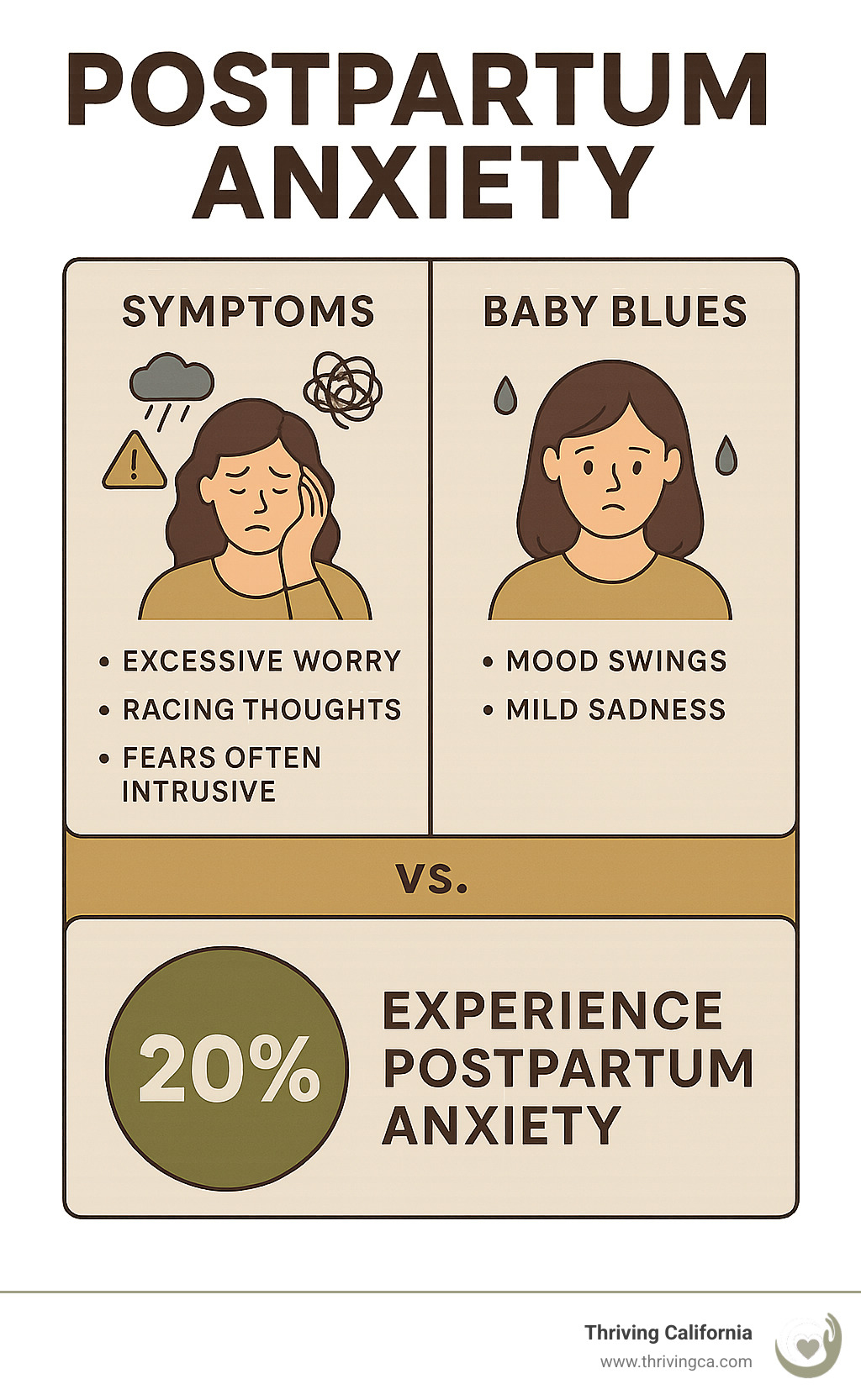Counseling for Postpartum Anxiety—Because You Deserve Peace
Postpartum anxiety counseling provides targeted support for new mothers and parents struggling with intense worry, intrusive thoughts, and persistent anxiety disorders after childbirth. Through personalized therapeutic approaches, our group practice creates a safe space where you can explore the root causes of your symptoms, develop healthier coping strategies, and reclaim your mental health while strengthening the bond with your new baby.
Becoming a parent transforms your entire world. While this journey brings profound joy, it also presents challenges that can trigger severe anxiety and overwhelming feelings. For many mothers and parents, the natural concerns about caring for a new baby evolve into something more intense—anxiety disorders that disrupt day to day life and steal peace from the postpartum period. If you're experiencing these symptoms of postpartum anxiety, you're not alone. This common perinatal mood condition affects countless women and responds well to professional treatment.
At Thriving California, our group practice of doctoral-level clinicians specializes in helping mothers navigate postpartum depression and anxiety. We understand the unique mental health challenges facing parents with children aged 0-3, and we're passionate about guiding you toward healing through evidence-based treatment approaches.
Understanding Postpartum Anxiety: More Than Just "New Parent Nerves"
While some worry comes naturally after giving birth, postpartum anxiety represents one of several anxiety disorders that can emerge during the postpartum period. This condition involves persistent, intense symptoms that significantly impact your daily functioning and mental health. Many women experience racing thoughts, disturbing intrusive thoughts, or an unshakeable feeling that something terrible will happen to their baby.
These intrusive thoughts often feel completely foreign to mothers experiencing them. You might have unwanted mental images about potential harm coming to your baby—thoughts that cause extreme distress precisely because they oppose everything you want for your child. These symptoms of postpartum anxiety reflect the condition itself, not your true desires or intentions.
Hypervigilance represents another common manifestation many mothers face. You might find yourself unable to let others care for your baby, experiencing difficulty sleeping even when the baby sleeps peacefully, or developing intense fears that lead to avoiding social situations. Some women experience panic attacks or physical symptoms like rapid heartbeat, dizziness, or difficulty breathing. When these patterns become more structured, they can develop into presentations resembling obsessive compulsive disorder within the context of the postpartum period.
Our group practice recognizes that every mother's experience with postpartum anxiety differs. Through our personalized treatment approach, we help you understand your specific symptoms and develop strategies that work for your individual situation while supporting your overall mental health.

Recognizing Signs and Symptoms of Postpartum Depression and Anxiety
Understanding how postpartum anxiety and depression manifest helps mothers recognize when professional treatment might benefit them. These symptoms affect emotional well-being, physical health, and daily behaviors in interconnected ways.
Emotional symptoms often include persistent worry that feels uncontrollable, feeling sad or hopeless, experiencing mood swings, racing thoughts that won't slow down, irritability that feels disproportionate to situations, feeling overwhelmed by daily tasks, and difficulty bonding with your baby due to anxious thoughts.
Physical symptoms might involve difficulty sleeping or insomnia even when exhausted, disrupted sleep patterns when the baby sleeps, panic attacks with heart palpitations, chronic fatigue, changes in appetite, persistent muscle tension, headaches, or gastrointestinal issues. These physical symptoms often intensify the emotional distress mothers experience during the postpartum period.
Behavioral changes could include avoiding certain situations, becoming excessively cautious, repeatedly checking on your baby, withdrawing from family members and friends, or struggling to maintain household chores and daily responsibilities.
When these symptoms of postpartum anxiety interfere with your ability to care for yourself or your new baby, professional postpartum anxiety counseling can provide crucial support and treatment.
Distinguishing Baby Blues from Postpartum Anxiety Disorders
Many new mothers experience the "baby blues"—mild mood fluctuations and feeling overwhelmed in the first two weeks after childbirth. These temporary feelings affect most women and typically resolve naturally as hormones stabilize.
Postpartum anxiety and depression differ significantly from baby blues. The intensity, duration, and impact distinguish clinical anxiety disorders from normal adjustment. If symptoms persist beyond two weeks, cause severe anxiety or panic attacks, create difficulty sleeping, or interfere with bonding with your baby, you're likely experiencing a perinatal mood disorder that warrants professional treatment.
Understanding the Relationship Between Postpartum Anxiety and Depression
While often discussed together, postpartum anxiety and postpartum depression represent distinct perinatal mental health conditions, though many mothers experience elements of both. Recognizing these differences ensures appropriate treatment approaches.
Postpartum anxiety centers on worry, fear, and future-oriented concerns about your baby's safety and well-being. In contrast, postpartum depression typically involves deep sadness, feeling sad persistently, hopelessness, and disconnection from previously enjoyable activities. Depression symptoms might include feeling emotionally numb, experiencing guilt about your abilities as a mother, or having difficulty finding joy in your new baby.
Many women experience overlapping symptoms of both conditions. Prolonged anxiety often contributes to developing depression, while depression can fuel anxious thoughts. Our doctoral-level clinicians help mothers understand their unique constellation of symptoms without forcing experiences into rigid categories, ensuring treatment addresses individual mental health needs.
Risk Factors: Why Postpartum Anxiety and Depression Develop
Postpartum anxiety and depression emerge from complex interactions between biological, psychological, and social risk factors—none reflecting personal failure. Understanding these contributors helps reduce self-blame and guides treatment approaches.
Biological factors include dramatic hormonal shifts after childbirth affecting brain chemistry and emotional regulation. The postpartum period brings unprecedented physical changes. Combined with sleep deprivation inherent in caring for a new baby, mothers' nervous systems can become chronically activated, making calm feel impossible.
Psychological risk factors encompass the massive identity shift accompanying motherhood, personal or family history of anxiety disorders or depression, and the impact of difficult birth experiences. Many mothers struggle with perfectionism and societal pressures. Previous mental health challenges or trauma increase vulnerability to postpartum anxiety and depression.
Social and environmental factors play crucial roles. Limited support, financial stress, relationship difficulties, or isolation intensify symptoms. Previous pregnancy losses heighten anxiety. Social media's unrealistic portrayals of motherhood amplify feelings of inadequacy when your reality doesn't match idealized images.
For mothers who've experienced traumatic births, these experiences often trigger or worsen postpartum anxiety. Our group practice offers specialized birth trauma therapy as part of comprehensive treatment for affected mothers.
Timeline: When Postpartum Anxiety and Depression Occur
Perinatal mood disorders don't follow predictable timelines. Some women experience anxiety during pregnancy continuing into the postpartum period. Others develop symptoms weeks or months after giving birth. Unlike baby blues, these anxiety disorders and depression typically persist or worsen without appropriate treatment.
Without professional support, postpartum anxiety and depression can continue affecting mothers' well-being and family relationships for extended periods. However, with proper treatment through therapy and sometimes medication, women experience significant improvement and develop lasting strategies for managing symptoms.
How Our Postpartum Anxiety Counseling Provides Treatment
At Thriving California, we understand each mother's journey through postpartum anxiety and depression is unique. Our group practice provides personalized treatment honoring individual experiences while utilizing evidence-based approaches proven effective for perinatal mental health conditions.
Our doctoral-level clinicians utilize psychodynamic and relational therapy approaches, helping mothers explore how past experiences influence current emotional responses to motherhood. This depth-oriented treatment addresses underlying patterns fueling anxiety and depression symptoms.
We might explore together how your childhood experiences shape anxieties about parenting. We examine unconscious expectations activated by motherhood. Through bringing patterns into awareness, mothers gain power to choose healthier responses rather than repeating familiar but unhelpful patterns.
This exploration isn't about blame—it's about gaining insights empowering change. We help you understand how current symptoms connect to deeper patterns while developing practical strategies for managing anxiety and depression in daily life with your baby.
For mothers dealing with birth trauma contributing to their postpartum anxiety, we offer specialized therapy using bilateral stimulation techniques. This focused treatment typically involves 3-6 individual sessions or 6-12 couples sessions, helping process your birth story comprehensively. Many mothers find their birth experiences become significantly less triggering through this specialized treatment approach.

What to Expect from Treatment at Thriving California
Beginning therapy for postpartum anxiety and depression represents an important step in recovery. We understand reaching out requires courage when you're already feeling overwhelmed by symptoms and new baby demands.
Your treatment journey typically starts with a free 20-minute consultation discussing your symptoms and ensuring we're a good match. If another approach would better serve your mental health needs, we provide appropriate referrals. During consultation, we discuss practical matters including session scheduling and fees.
Once treatment begins, expect weekly 50-minute therapy sessions building a strong therapeutic relationship. This relationship becomes the foundation for exploring vulnerable aspects of motherhood and symptoms in a non-judgmental space.
For mothers seeking standard depth-oriented therapy for postpartum anxiety and depression, initial sessions focus on understanding your unique situation and symptoms. We hold your goals in mind while remaining flexible, recognizing that what brings mothers to treatment initially might evolve. This flexibility allows addressing what feels most pressing each session.
You might explore current stressors affecting your mental health, relationships with your baby and partner, or past experiences informing present anxieties. We follow your lead while occasionally offering observations about patterns in your symptoms or suggesting areas for exploration. Sometimes we recommend resources supporting your therapy work, though we don't assign formal homework.
Supporting Relationships Through Postpartum Mental Health Challenges
A new baby transforms couple relationships profoundly. Sleep deprivation, changing roles, postpartum anxiety and depression can strain partnerships. Many couples experience increased conflict, emotional distance, or difficulty communicating about symptoms and needs.
Our relational approach helps both partners understand anxiety disorders and depression as medical conditions requiring compassion, not character flaws. We facilitate effective communication about mental health needs while navigating new parenting roles together. Through this treatment, couples often emerge with deeper understanding and stronger bonds.
For couples where one or both partners experienced birth trauma, we provide specialized support recognizing how these experiences affect each person differently, strengthening connection through shared healing.
Building Support Systems During Treatment
Healing from postpartum anxiety and depression involves more than individual therapy—it requires support systems sustaining mothers through challenging moments. Partners and family members play crucial roles in treatment success.
For partners and loved ones, practical support makes meaningful differences. Taking initiative with baby care and household chores without being asked reduces burden on mothers managing symptoms. Emotional validation matters equally—acknowledging the reality of anxiety disorders and depression without minimizing symptoms or offering quick fixes.
Education about perinatal mental health helps loved ones respond supportively. Understanding that intrusive thoughts are symptoms, not intentions, allows partners to offer compassion. Encouraging professional treatment while emphasizing that seeking help shows strength supports recovery.
For mothers in treatment, certain practices complement therapy work. Prioritizing sleep whenever your baby sleeps helps regulate mood and anxiety. Gentle physical activity like walking can reduce symptoms when energy allows. Simple grounding techniques can interrupt panic attacks or racing thoughts.
Maintaining nutrition and hydration supports emotional regulation, as these affect anxiety and depression symptoms. Setting realistic expectations while accepting help reduces pressure. Connecting with other mothers who understand postpartum challenges combats isolation.
Medication Considerations for Breastfeeding Mothers
Many mothers have questions about medication for postpartum anxiety and depression while breastfeeding. These concerns require consultation with your doctor or psychiatrist specializing in perinatal mental health. Medical professionals can discuss whether medication might benefit your treatment plan and address breastfeeding compatibility concerns.
Some mothers find therapy alone provides sufficient treatment for their symptoms. Others benefit from combining therapy with medication prescribed by their doctor. Our therapeutic approach provides powerful support either way, working collaboratively with your medical team when medication is part of treatment.
We respect each mother's decisions about medication and breastfeeding, providing non-judgmental support regardless of your treatment choices. Your mental health matters for both you and your baby, and we help you navigate these decisions thoughtfully.
The Importance of Seeking Treatment for Postpartum Anxiety
Left unaddressed, postpartum anxiety and depression can evolve into chronic mental health conditions affecting long-term well-being. Untreated symptoms may impact your baby's development and your bonding relationship. In rare cases, severe untreated perinatal mood disorders can progress to postpartum psychosis, requiring immediate medical attention.
Seeking professional treatment through postpartum anxiety counseling represents an investment in your family's wellness. Many mothers worry about stigma when considering therapy for mental health concerns. Remember that postpartum anxiety and depression are common medical conditions affecting numerous women. Taking steps toward treatment demonstrates strength and commitment to your family's well-being.
Common Questions About Postpartum Anxiety Counseling and Treatment
When should mothers seek professional help? Consider treatment when anxiety or depression symptoms interfere with daily life, prevent enjoying your baby, cause panic attacks or physical symptoms, create difficulty sleeping beyond normal new parent exhaustion, or leave you feeling isolated. Early treatment often leads to better outcomes.
What if I need medication while breastfeeding? Medication questions require consultation with medical professionals. Your doctor can discuss options and help make informed decisions about incorporating medication into your treatment plan while breastfeeding. Our therapy provides comprehensive support whether or not medication becomes part of your treatment approach.
How long does treatment take? Treatment duration varies based on individual needs and symptom severity. Some mothers find significant relief within weeks, while others benefit from longer-term support. Birth trauma therapy typically requires 3-6 individual sessions. We work at your pace, adjusting treatment to your evolving needs.
Beginning Your Journey Toward Recovery
Living with postpartum anxiety and depression can feel overwhelming and isolating. The constant worry, intrusive thoughts, mood swings, and physical symptoms steal joy from early motherhood. Please know these experiences don't define you as a mother, and effective treatment is available.
At Thriving California, our group practice specializes in helping mothers find their way back to mental health and confident parenting. Our doctoral-level clinicians understand the unique challenges of the postpartum period. We offer personalized, depth-oriented therapy addressing not just symptoms but underlying patterns fueling anxiety and depression.
Whether you're in Napa, Lafayette, Thousand Oaks, or anywhere in California through our telehealth services, treatment is accessible. We recognize that seeking help while caring for a new baby presents challenges, which is why we offer flexible scheduling and remote sessions allowing you to receive postpartum anxiety counseling from home.
Your mental health recovery matters for your entire family. When mothers address postpartum anxiety and depression with professional treatment, they model self-care, break cycles of mental health struggles, and create space for joyful, connected parenting experiences.
Taking the first step might feel daunting, but countless mothers have walked this path before you, finding their way through treatment to calmer, more confident motherhood. You deserve to experience the full joy of your new baby without the constant weight of anxiety and depression symptoms.
Contact Thriving California today to schedule your free consultation and begin your treatment journey toward mental health and wellness.




